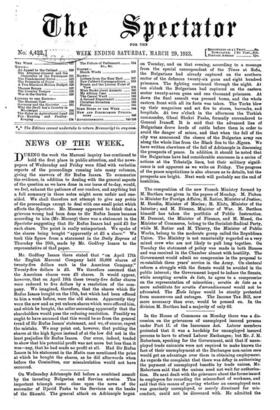Mr. Godfrey Isaacs there stated that "on April 17th the
English Marconi Company held 35,000 shares of twenty-five dollars each in the American Company." Twenty-five dollars is £5. We therefore assumed that the American shares were £5 shares. It would appear, however, that on April 18th these twenty-five dollar shares were reduced to five dollars by a resolution of the com- pany. We imagined, therefore, that the shares which Sir Rufus Isaacs bought on the 17th, but which had been offered to him a week before, were the old shares. Apparently they were the new and as yet unborn shares which were offered him, and which he bought, the seller assuming apparently that the shareholders would pass the reducing resolution. Possibly we ought to have assumed that this would be so from the general trend of Sir Rufus Isaacs' statement, and we, of course, regret the mistake. We may point out, however, that putting the shares at the high figure instead of at the low did not in the least prejudice Sir Rufus Isaacs. Our error, indeed, tended to show that his potential profit was not more but less than it was—nay, that he had made no profit at all. Had Sir Rufus Isaacs in his statement in the Malin case mentioned the price at which he bought the shares, as he did afterwards when before the Committee, our miscalculation would not have occurred.










































